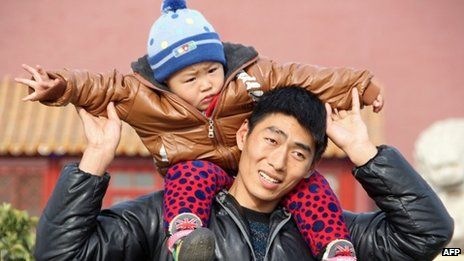 The one-child policy has been strictly enforced, but has become unpopularChina's top legislature has formally adopted a resolution easing the country's one-child policy, the state news agency Xinhua reports, bbc reports.
The one-child policy has been strictly enforced, but has become unpopularChina's top legislature has formally adopted a resolution easing the country's one-child policy, the state news agency Xinhua reports, bbc reports.
The Standing Committee of the National People's Congress passed a resolution allowing couples to have two children if either parent is an only child.
A proposal to abolish re-education through labour camps was also approved.
The changes in policy were announced following a meeting of top Communist Party officials in November.
The reforms, which came at the end of a six-day meeting of the congress, have already been tested in parts of the country.
They needed formal legislative approval to be put into effect.
'Leftover men'
China introduced its one-child policy at the end of the 1970s to curb rapid population growth.
But correspondents say the policy has become increasingly unpopular and that leaders fear the country's ageing population will both reduce the labour pool and exacerbate elderly care issues.
By 2050, more than a quarter of the population will be over 65.
The one-child policy has on the whole been strictly enforced, though some exceptions already exist, including for ethnic minorities.
The traditional preference for boys has created a gender imbalance as some couples opt for sex-selective abortions.
By the end of the decade, demographers say China will have 24 million "leftover men" who, because of China's gender imbalance, will not be able to find a wife.
Former inmate Liu Hua speaks about the horrors of life in a labour camp
The decision to close the labour camps puts an end to a controversial punishment system long criticised for its human rights abuses.
State media said the development of China's legal system had made the camps "superfluous" and signalled the end of their "historic mission".
Chinese leaders had previously said they wanted to reform the system.
The network, which was created in the 1950s based on the Soviet Gulag, allowed the Chinese police to send anyone to prison for up to four years without a trial.
A labour camp sentence was almost impossible to appeal.
China had 260 labour camps holding 160,000 inmates at the start of this year, according to figures from the Ministry of Justice and Human Rights Watch.
Correspondents say most of the detainees were arrested for drug offences - either selling or buying small quantities of illegal narcotics.
Some of the labour camps are expected to be transformed into drug rehabilitation centres.
 В Атырау -10
В Атырау -10